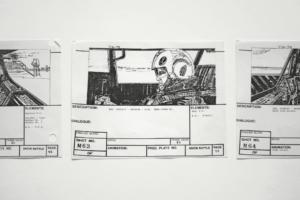If you want to learn how to write a spec script, you need to develop a deep understanding of the structure, format, and art of screenwriting before you begin.
1. Find inspiration:
Art is all about imitation, so use these tips to help you get inspired.
- Read great screenplays.
- Listen to music.
- List and watch 20 movies you wish you’d written.
- Write an outline of someone else’s movie.
- Look at sample scripts: Sample 1, Sample 2, and Sample 3 (film overview).
2. Read about screenwriting:
Learn as much as you can about the art of screenwriting from professionals. Consider reading these highly valuable screenwriting guides to help you hone your writing skills.
- Save the Cat! by Blake Snyder
- Screenplay: The Foundations of Screenwriting by Syd Field
- The Coffee Break Screenwriter by Pilar Alessandra
- The TV Writer’s Workbook by Ellen Sandler
- Selling Your Story in 60 Seconds by Michael Hauge
- Writing the TV Drama Series by Pamela Douglas
- The Screenwriter’s Bible: A Complete Guide to Writing, Formatting, and Selling Your Script by David Trottier
- From Script to Screen by Linda Seger
- Hollywood Standard: The Complete and Authoritative Guide to Script Format and Style by Christopher Riley
- Writing Great Screenplays for Film and Tv by Dona Cooper
3. Make it extraordinary:
Find ways to make your work stand out from other screenplays by:
- Using unique elements and making unusual choices in your story
- Using your family, friends, missteps, and achievements as inspiration for characters
- Staying updated on current events and using them to inform the themes and messages of your work.
- Reading about any topics, ideas, or locations to better educate yourself before you start writing.
- Reading scripts and analyzing them. You’ll see what’s effective and can put that to work in your screenplay. To analyze a script:
- Note effective elements.
- Track technical notes, like action and subheadings.
- Identify areas that don’t work.
- Review your analysis for takeaways.
4. Identify a conflict or theme central to your story:
Consider events happening in the world around you or unifying concepts you’d like to explore as inspiration.
5. Select a film genre for your story:
You can also combine film genres to make something unique.
6. Pick a setting for your film:
Use your theme and genre to help guide your setting choices.
7. Create a dynamic protagonist:
The protagonist should have a central goal they want to achieve throughout the screenplay.
8. Build an oppositional antagonist:
This could be a person, idea, or event that keeps your protagonist from easily achieving their goal.
9. Write a logline that summarizes your idea:
This one- or two-sentence summary should clearly capture the main ideas in your script.
10. Create a story world:
Establishing the world in which your story exists is vital for writing an authentic and believable screenplay. Key elements include:
- Brainstorming: Gather potential ideas to use in your script.
- Concept: This should be a clear central tenet that you can summarize in your logline.
- Story: While you won’t have every scene yet, you should know the basic high and low points of the screenplay.
- Characters: Know a bit about your main characters.
11. Make your concept or story more interesting:
If you’re having trouble breaking out of traditional script ideas, use these strategiesto help you add interest to your screenplay:
- Think about your favorite type of movie.
- Brainstorm unique ideas for your plot.
- Read screenplay outlines and treatments.
- Seek feedback on your outline.
12. Outline your script:
When you create your screenplay outline, include specific details related to:
- Plotting: Identify the major plot points in the story.
- Scenes: Note specific scenes or potential scene ideas.
- Character development: Iterate how your protagonist will get from point A to point B.
- Conclusion: Know how the story will end.
13. Establish interesting characters:
While things like hard work, luck, and dedication all play a part in writing a great script, pushing your imagination is the most important factor. Ask yourself these questions to help bring your characters to life:
- Will these characters leave an impression?
- Am I excited as I write about these characters?
- Are these characters predictable?
- Are their flaws to blame for the bad things that happen to them?
14. Think outside of traditional character traits like “loyal” and “handsome.”
Look for unusual descriptors like:
- Humorless
- Retro
- Loner
15. Format your script:
Before you begin fleshing out your script idea, you should have a working knowledge of screenplay elements. The most common elements and transitions found in a screenplay include:
- Scene Heading: Also known as a slugline, this one-line description of the time of day and location of a scene is always in all caps.
- Subheader: This element helps identify minor distinctions within a scene, like a cut between two locations.
- Action: These lines describe the scene events in present tense.
- Character: Names should be listed in all caps the first time they’re introduced in action and when listed above dialogue.
- Dialogue: This is a character’s lines of speech.
- Parenthetical: These additional directions are how a character says a line.
- Extension: These are technical notes, like specifying that a line is spoken off-camera.
- Transition: Transitions are directions for film editors.
- Shot: This is used to indicate the point of view of the scene has shifted.
- Montage: A montage is a series of shots showing the passage of time.
- Chyrons: Chyrons indicate the time and place of a scene, usually in text over the video.
- Lyrics: If your script includes lyrics, you can add them interspersed with dialogue or note the general feeling of the song with the actual song included separately.
- Fade In: Fade in is listed at the very beginning of the script.
- Cut To: You should use “cut to” to indicate a change in location.
- End of Act: Use this at the end of each act, typically for a TV script.
- Fade Out: Fade out indicates the end of the script.
16. Create your first draft:
Write your script’s first draft by setting specific goals and deadlines, writing a predetermined number of pages per day, ensuring your dialogue sounds natural, and keeping your script around 90 to 120 pages.
- The first page of the script: The first page of your script should start with the words “FADE IN.” Your actual script begins there, usually with a scene description, character notes, and any other exposition before beginning character dialogue.
- Script diary: To delve deeper into the writing process, keep a daily diary of your feelings, ideas, and revelations about your script before you tackle your pages.
17. Revise your script:
After you’ve written your first draft, take a break from it for a week or two to reset your mind. To write is to rewrite, so it’s vital that after your brief break from your screenplay, you come back to it.
18. Share your script with others:
Seek feedback from people you trust to help you refine your script. Ask them for notes on the concept, plot, setting, characters, and dialogue to help you refine all elements of the screenplay. Use professional consultants, like from Script Reader Pro, to get even more valuable feedback.
19. Rewrite:
Rewriting is a vital component of revision. Make changes and updates to clarify your story based on notes from trusted friends, colleagues, or mentors as well as your own thoughts.
20. Edit:
Look for and fix any grammatical or spelling errors as you see them during the revision process. Ensure your screenplay’s format is appropriate and matches the specifications of scripts.
21. Prepare your script for presentation:
Once your script is complete, prepare and bind it for presentation:
- Print the title page and script on three-hole punched paper.
- Place the title page and script in the script cover.
- Add brass fasteners in the top and bottom holes.
- Slip washers on the back of the fasteners.
- Hammer the fasteners flat with a script binding mallet.
22. Use screenplay formatting software:
Using screenplay formatting software can save you an enormous amount of time when planning and writing.
- For story development:
- For screenwriting:
23. Surround yourself with creatives:
Find a community that supports your dreams, like a film school.
Documentary screenwriting follows its own process since much of the script is created after filming occurs, which changes the order and manner in which you create the screenplay. For more information on writing a script for a documentary, check out this video.
With dedication, perseverance, and education, you can become an outstanding screenwriter. You can learn more about scriptwriting and how you can improve your skills by applying to the Nashville Film Institute here.












